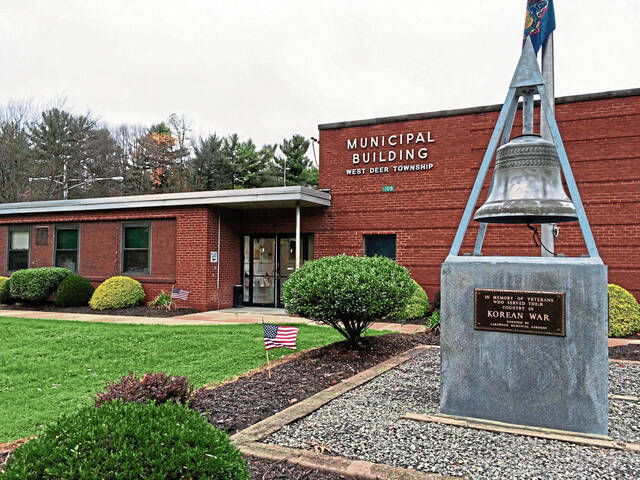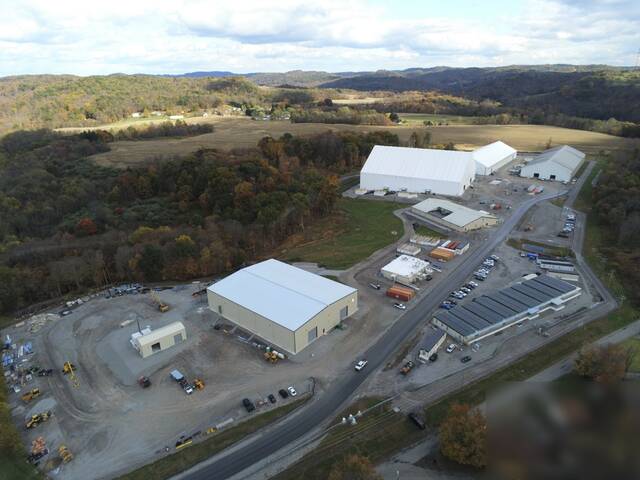West Deer officials are putting the final touches on a proposed $10.8 million budget for 2024 that will see a tax increase that outweighs an accompanying decrease for most residents.
The paradox is due to the establishment of a half-mill fire tax approved by voters Nov. 7 in a referendum.
It replaces an annual flat tax of $40 per residential property and $100 per commercial property, Township Manager Dan Mator said.
A unanimous vote of the supervisors supported shaving 0.09 of a mill from the township’s current general fund budget levy of 2.99 mills, making it 2.9 mills.
But adding the 0.5-mill fire tax brings the overall township tax rate for 2024 up to 3.4 mills.
Under the old tax rate of 2.99 mills, the owner of a house carrying the township’s average assessment of $117,600 would pay about $352 in township taxes.
With the new tax rate of 3.4 mills, that same house would have a township tax bill of about $400. That’s an increase of $48 or about $20 more than under the old flat fire tax.
Mator said some residents will pay more under the new fire tax while others could actually pay less.
“It all depends on their assessment,” he said.
According to Mator, the new fire tax was the result of a fire study done by the state which recommended a review of the funding for the three fire companies.
He said after looking at detailed financial information from the fire companies, which requested a funding increase and meeting with fire company officials on June 1, the supervisors concluded that the companies could cover operation costs such as fuel, training, vehicle maintenance and equipment costs with the flat fire tax.
The supervisors also realized that the companies would not be able to save enough to replace firefighting vehicles, the cost of which has skyrocketed over the years.
The supervisors agreed that changing to a millage-based fire tax was the best way to solve the problem, but they could not do it on their own under the township charter.
“What better way to decide it than to send it to the residents, the voters,” Mator said.
The ballot issue was approved by a narrow margin of 88 votes, according to unofficial election results from the Allegheny County Elections Department.
The flat tax had provided the fire companies with a pool of about $225,000. With a half-mill of taxes, Mator said that will increase to around $390,000 or $55,000 per fire company.
He emphasized that the fire tax proceeds, under law, cannot be used for other purposes, including paying for new fire stations, despite social media rumors to the contrary.
Several fire company officials asked what the township was looking for in terms of accountability as part of the new fire tax at the Nov. 15 supervisors meeting.
“I think what the board wants to see is the actual financial health of each fire company,” Mator said.
He said the whole idea is to provide oversight for the supervisors and accountability for the fire companies and for the process not to be adversarial.
“Financials come to me and I give them to the board as part of my report,” Mator said. “They are confidential.”
One of the fire officials said that what Mator outlined is “pretty much” what they were discussing among themselves.
Salary increases
Another matter related to the budget was a question about the township increasing employees’ salaries, Mator’s in particular.
During the supervisors’ budget workshop session following the regular meeting, township resident Richard Hollibaugh asked how the board could justify a 21% increase for Mator.
Mator who has been with the township for 15 years was paid $110,950 in 2023; he will now be paid $135,000.
He is not alone. Police Chief Bob Loper will see his pay increase by about 19%, from $108,000 to $129,000
Supervisors chairwoman Beverly Jordan said the increases are part of an overall supervisors review of employee salaries and responsibilities.
“We had someone come in and do an assessment — what they are doing, what they should be doing, should they be doing more, should they do less,” Jordan said.
She said that was the starting point for the review, which continued by doing an analysis of what other similar-sized communities are paying employees.
“They were all about the same budget size, the same population,” Supervisor Vernon Frey said.
According to Jordan, those communities included Richland, Indiana Township, Ohio Township, Plum, South Park, Findlay, Brentwood, Marshall, Jefferson Hills and Lower Burrell.
“We were looking to give our people the average,” Jordan said. “We can’t give one department the average and not another.”
The percentage of increases to get to that average varies, she said, but taking that step is important “if we want to keep good people” in the township.
Mator said employees, including himself, have been approached with offers from other communities seeking to lure them away.
On the whole, he said, the increase in employee salaries averages about 10%.
As for how the township is able to cover those expenses while cutting the general fund tax rate by almost one-tenth of a mill, Mator said it comes down to growth.
“We’re growing, the township is growing,” he said. “It’s smart growth. It’s something we planned for 10 years ago, and it’s coming to fruition.”
He said upscale housing developments are leading the way.
“The houses we have coming in now are selling at between $300,000 and $500,000,” Mator said.
While those dwellings increase real estate tax revenues, the people buying them have to be holding good jobs in order to pay for them, he said. That increases the earned income tax revenue as well.
The $10.79 million general fund budget will come up for approval Dec. 20.








